英语学案Uint10,7B 封丽平
- 格式:doc
- 大小:75.00 KB
- 文档页数:3
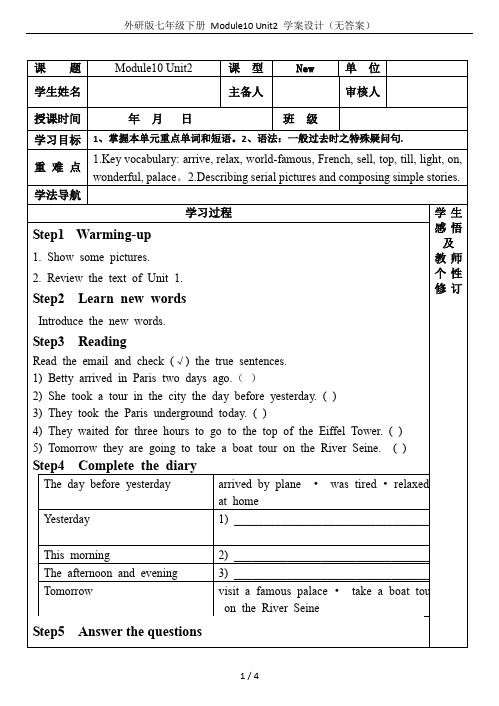
外研版七年级下册 Module10 Unit2 学案设计(无答案)1 / 4课 题 Module10 Unit2课 型 New 单 位 学生姓名主备人审核人 授课时间 年 月 日班 级学习目标 1、掌握本单元重点单词和短语。
2、语法:一般过去时之特殊疑问句.重 难 点1.Key vocabulary: arrive, relax, world-famous, French, sell, top, till, light, on, wonderful, palace 。
2.Describing serial pictures and composing simple stories.学法导航 学习过程学生 感悟 及 教师个性修订Step1 Warming-up1. Show some pictures.2. Review the text of Unit 1.Step2 Learn new wordsIntroduce the new words.Step3 ReadingRead the email and check (√) the true sentences. 1) Betty arrived in Paris two days ago.( )2) She took a tour in the city the day before yesterday. ( ) 3) They took the Paris underground today. ( )4) They waited for three hours to go to the top of the Eiffel Tower. ( ) 5) Tomorrow they are going to take a boat tour on the River Seine. ( )Step4 Complete the diaryThe day before yesterday arrived by plane • was tired • relaxed at homeYesterday 1) __________________________________This morning2) __________________________________ The afternoon and evening 3) __________________________________ Tomorrowvisit a famous palace • take a boat tour on the River SeineStep5 Answer the questions1)Who met Betty at the airport?2) What did she see in the Louvre Museum?3)Where did she go this morning?4)When did they go to the Eiffel Tower?5)How did they get to Eiffel Tower?Step 6 Complete the passagearrive date French relax till topThe (1) __________ today is 1st June. We (2) __________ in the (3) __________ capital, Paris, on 30th May, and we’re going to stay (4) __________ 3 rd June. On 30th May we were tired so we (5) __________. But on 31st May we went to Louvre Museum and had dinner in a restaurant. And today we went to street markets. We also went to the (6) ___________ of the Eiffel Tower.Step 7 Grammar语法点拨——一般过去时之特殊疑问句:在一般过去时中,以疑问词开头,对句中某一成分提问的句子。
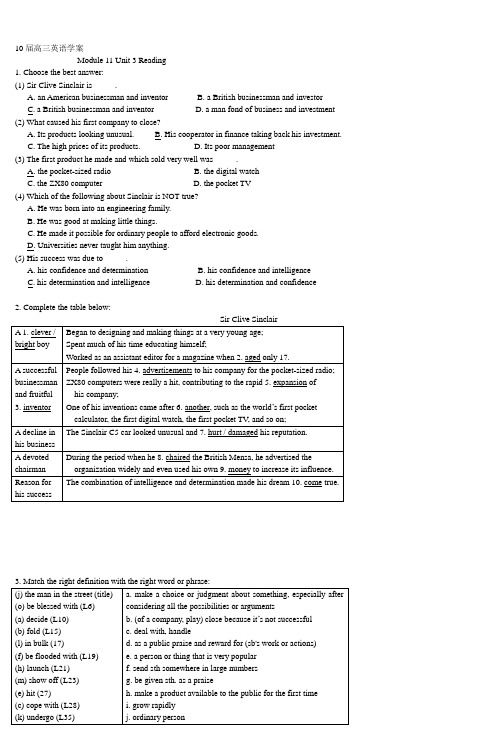
10届高三英语学案Module 11 Unit 3 Reading1. Choose the best answer:(1) Sir Clive Sinclair is _____.A. an American businessman and inventorB. a British businessman and investorC. a British businessman and inventorD. a man fond of business and investment(2) What caused his first company to close?A. Its products looking unusual.B. His cooperator in finance taking back his investment.C. The high prices of its products.D. Its poor management(3) The first product he made and which sold very well was _____.A. the pocket-sized radioB. the digital watchC. the ZX80 computerD. the pocket TV(4) Which of the following about Sinclair is NOT true?A. He was born into an engineering family.B. He was good at making little things.C. He made it possible for ordinary people to afford electronic goods.D. Universities never taught him anything.(5) His success was due to _____.A. his confidence and determinationB. his confidence and intelligenceC. his determination and intelligenceD. his determination and confidence2. Complete the table below:4. Fill in the blanks in the following sentences with the words or phrases from the box above:a. She decided (that) she was being treated in an unfair way.b. He was honored with an award for excellence in teaching.c. The new model is announced be launched in July next year.d. He was luck enough to get some investments when his company was on its last legs.e. Desert plants are adapted to cope with extreme heat.f. He was presented with a gold watch in recognition of his service to the company.g. The US market was / is flooded with cheap imported goods from Asian countries.h. The advertising industry has to know exactly what the man in the street is thinking.i. The new musical (音乐剧)folded after only twenty performances.j. It is usually cheaper to by in bulk.k. Immigrants often undergo a kind of stress from the culture shock.l. He likes to show off how well he speaks French.m. Poor though we are, we are blessed with five lovely grandchildren.n. By the 1980s, the computer industry was booming.o. The Harry Porter series is a real hit and has raised a lasting “Porter fever” around the globe.。
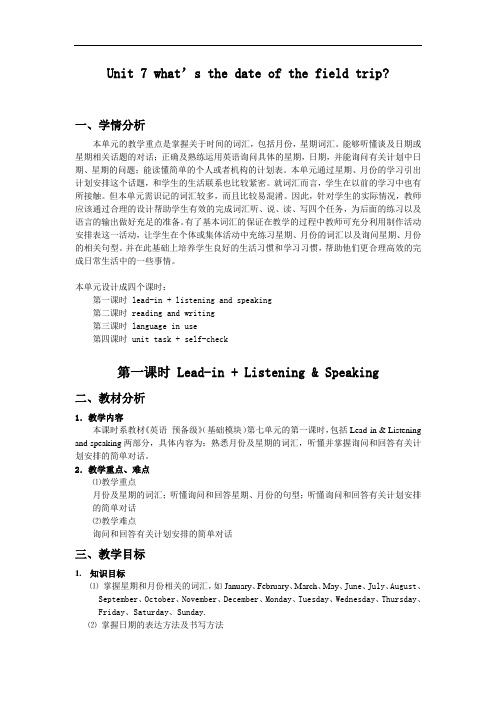
Unit 7 what’s the date of the field trip?一、学情分析本单元的教学重点是掌握关于时间的词汇,包括月份,星期词汇。
能够听懂谈及日期或星期相关话题的对话;正确及熟练运用英语询问具体的星期,日期,并能询问有关计划中日期、星期的问题;能读懂简单的个人或者机构的计划表。
本单元通过星期、月份的学习引出计划安排这个话题,和学生的生活联系也比较紧密。
就词汇而言,学生在以前的学习中也有所接触。
但本单元需识记的词汇较多,而且比较易混淆。
因此,针对学生的实际情况,教师应该通过合理的设计帮助学生有效的完成词汇听、说、读、写四个任务,为后面的练习以及语言的输出做好充足的准备。
有了基本词汇的保证在教学的过程中教师可充分利用制作活动安排表这一活动,让学生在个体或集体活动中充练习星期、月份的词汇以及询问星期、月份的相关句型。
并在此基础上培养学生良好的生活习惯和学习习惯,帮助他们更合理高效的完成日常生活中的一些事情。
本单元设计成四个课时:第一课时 lead-in + listening and speaking第二课时 reading and writing第三课时 language in use第四课时 unit task + self-check第一课时 Lead-in + Listening & Speaking二、教材分析1.教学内容本课时系教材《英语预备级》(基础模块)第七单元的第一课时,包括Lead-in & Listening and speaking两部分,具体内容为:熟悉月份及星期的词汇,听懂并掌握询问和回答有关计划安排的简单对话。
2.教学重点、难点⑴教学重点月份及星期的词汇;听懂询问和回答星期、月份的句型;听懂询问和回答有关计划安排的简单对话⑵教学难点询问和回答有关计划安排的简单对话三、教学目标1.知识目标⑴掌握星期和月份相关的词汇,如January、February、March、May、June、July、August、September、October、November、December、Monday、Tuesday、Wednesday、Thursday、Friday、Saturday、Sunday.⑵掌握日期的表达方法及书写方法(3)掌握询问、回答日期,星期所使用的句型,如:--What day is it today? --It’s…--What’s the date today? --It is …(4) 掌握询问活动日期的相关句型--What’s the date of…? –-…2.能力目标⑴学生能听懂关于询问和回答星期和日期的对话。
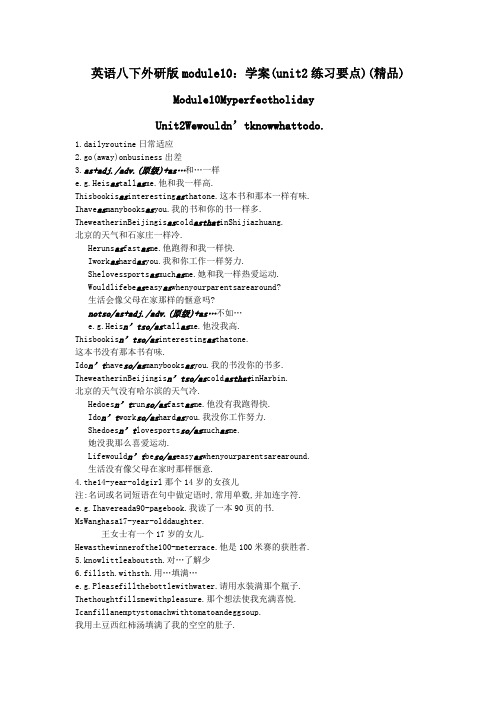
英语八下外研版module10:学案(unit2练习要点)(精品)Module10MyperfectholidayUnit2Wewouldn’tknowwhattodo.1.dailyroutine日常适应2.go(away)onbusiness出差3.as+adj./adv.(原级)+as…和…一样e.g.Heis as tall as me.他和我一样高.Thisbookis as interesting as thatone.这本书和那本一样有味.Ihave as manybooks as you.我的书和你的书一样多.TheweatherinBeijingis as cold asthat inShijiazhuang.北京的天气和石家庄一样冷.Heruns as fast as me.他跑得和我一样快.Iwork as hard as you.我和你工作一样努力.Shelovessports as much as me.她和我一样热爱运动.Wouldlifebe as easy as whenyourparentsarearound?生活会像父母在家那样的惬意吗?notso/as+adj./adv.(原级)+as…不如…e.g.Heis n’tso/as tall as me.他没我高.Thisbookis n’tso/as interesting as thatone.这本书没有那本书有味.Ido n’t have so/as manybooks as you.我的书没你的书多.TheweatherinBeijingis n’tso/as cold asthat inHarbin.北京的天气没有哈尔滨的天气冷.Hedoes n’t run so/as fast as me.他没有我跑得快.Ido n’t work so/as hard as you.我没你工作努力.Shedoes n’t lovesports so/as much as me.她没我那么喜爱运动.Lifewould n’t be so/as easy as whenyourparentsarearound.生活没有像父母在家时那样惬意.4.the14-year-oldgirl那个14岁的女孩儿注:名词或名词短语在句中做定语时,常用单数,并加连字符.e.g.Ihavereada90-pagebook.我读了一本90页的书.MsWanghasa17-year-olddaughter.王女士有一个17岁的女儿.Hewasthewinnerofthe100-meterrace.他是100米赛的获胜者.5.knowlittleaboutsth.对…了解少6.fillsth.withsth.用…填满…e.g.Pleasefillthebottlewithwater.请用水装满那个瓶子. Thethoughtfillsmewithpleasure.那个想法使我充满喜悦. Icanfillanemptystomachwithtomatoandeggsoup.我用土豆西红柿汤填满了我的空空的肚子.befullof…充满…e.g.Thetrainisfullofpassengers.这辆火车载满了乘客. Thefieldisfullofsheepfeedingonthenewgrass.田野里到处是绵羊在吃嫩草.7.That’sall.就这些.Isthatall?就这些吗?8.lookafterourselves照顾我们自己9.burn(burned,burned或burnt,burnt)烧,烧焦,燃烧e.g.I’veburntmyhand.我烧伤了我的手.I’dforgetsomethingimportantandthenburnthesoup.我会不记得一些重要的事,把汤烧糊了.10.thebasiclifeskills差不多的生活技能11.Idon’tthink…我认为…不…e.g.Idon’tthinkyouareright.我认为你不对.Shedoesn’tthink…她认为…不…e.g.Shedoesn’tthinkteenagersgetenoughpractice.她认为青少年没有得到足够的锻炼.12.leavehome离开家13.gotocollege上大学14.dresssb.给某人穿衣服e.g.Motherisdressingthebaby.妈妈正在给孩子穿衣服. dressoneself给自己穿衣服.e.g.Teachersshoulddressthemselvesproperly.教师应当着装得体.bedressedin…穿着…e.g.Wearealwaysdressedinourschooluniforms.我们总是穿校服.比较:puton…表动作,“穿上”wear表状态,“穿着”dress表动作和状态均可e.g.表动作:She’sputtingthebaby’sclotheson.她正在给孩子穿衣服.=She’sdressingthebaby.表状态:Shealwayswearsblack.她总是穿黑色的衣服.=Sheisalwaysdressedinblack.15.emptyadj.空的fulladj.满的e.g.Therearethreeemptyhousesinthestreet.这条街上有三个空房子.Areyoufull?你饱了吗?16.stomachn.胃stomachache胃疼headache头疼toothache牙疼earache耳朵疼17.enoughadj.足够的enough修饰adj.时,enough位于adj.之后e.g.warmenoughgoodenoughbigenoughenough修饰n.时,enough可前可后,但一般在名词之前e.g.enoughfood/water18.everything任何情况(somethinganythingnothing)19.simpleadj.简单的complexadj.复杂的20.properadj.适合的,适当的,正确的e.g.Idon’tthinkthisdressisproperforgoingtochurchin.我觉得这件衣服不适合去教堂穿.properlyadv.适当地,正确地,得体地e.g.I’mlearningFrench,butIstillcan’tspeakitproperly. 我正在学英语,然而仍然说得不太准确. Teachersshoulddressthemselvesproperly.教师应当着装得体.21.not…atall一点也不e.g.Idon’tlikemeatatall.我一点也不喜爱肉.Formostteenagersitwouldn’tbeaholidayatall.关于大多数的年轻人来讲,这可全然算不上个假期.。
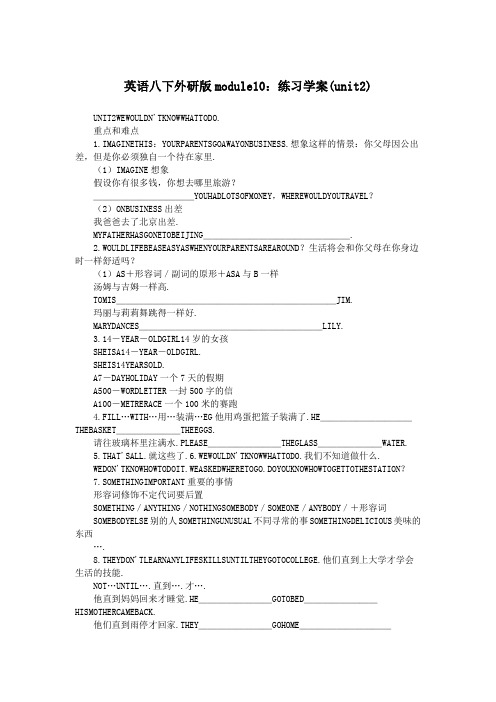
英语八下外研版module10:练习学案(unit2)UNIT2WEWOULDN'TKNOWWHATTODO.重点和难点1.IMAGINETHIS:YOURPARENTSGOAWAYONBUSINESS.想象这样的情景:你父母因公出差,但是你必须独自一个待在家里.(1)IMAGINE想象假设你有很多钱,你想去哪里旅游?___________YOUHADLOTSOFMONEY,WHEREWOULDYOUTRAVEL?(2)ONBUSINESS出差我爸爸去了北京出差.MYFATHERHASGONETOBEIJING________________.2.WOULDLIFEBEASEASYASWHENYOURPARENTSAREAROUND?生活将会和你父母在你身边时一样舒适吗?(1)AS+形容词/副词的原形+ASA与B一样汤姆与吉姆一样高.TOMIS________________________JIM.玛丽与莉莉舞跳得一样好.MARYDANCES____________________LILY.3.14-YEAR-OLDGIRL14岁的女孩SHEISA14-YEAR-OLDGIRL.SHEIS14YEARSOLD.A7-DAYHOLIDAY一个7天的假期A500-WORDLETTER一封500字的信A100-METRERACE一个100米的赛跑4.FILL…WITH…用…装满…EG他用鸡蛋把篮子装满了.HE__________THEBASKET_______THEEGGS.请往玻璃杯里注满水.PLEASE________THEGLASS_______WATER.5.THAT'SALL.就这些了.6.WEWOULDN'TKNOWWHATTODO.我们不知道做什么.WEDON'TKNOWHOWTODOIT.WEASKEDWHERETOGO.DOYOUKNOWHOWTOGETTOTHESTATION?7.SOMETHINGIMPORTANT重要的事情形容词修饰不定代词要后置SOMETHING/ANYTHING/NOTHINGSOMEBODY/SOMEONE/ANYBODY/+形容词SOMEBODYELSE别的人SOMETHINGUNUSUAL不同寻常的事SOMETHINGDELICIOUS美味的东西….8.THEYDON'TLEARNANYLIFESKILLSUNTILTHEYGOTOCOLLEGE.他们直到上大学才学会生活的技能.NOT…UNTIL….直到….才….他直到妈妈回来才睡觉.HE________GOTOBED________HISMOTHERCAMEBACK.他们直到雨停才回家.THEY________GOHOME__________THERAIN_____________.9.INONE'SOPINION依某人看来,10.DEPENDON依靠,依赖11.FORMOSTTEENAGERSITWOULDN'TBEAHOLIDAYATALL.对大多数青少年来说,那根本不是一个假期.NOT…ATALL根本不,一点也不.SHE_______LIKECHICKEN___________.她一点也不喜欢鸡肉跟踪练习【一】选择填空()1.I'LLGOTOPARIS________.A.FORBUSINESSB.TOBUSINESSC.INBUSINESSD.ONBUSINESS()2.IHAVEALITTLEBROTHER.HEIS___________.A.SEVEN-YEAR-OLDB.SEVENYEARSOLDC.SEVEN-YEARS-OLDD.SEVENYEAROLD()3.THEY______GOHOME_______THEFILMFINISHED.A.\;UNTILB.DIDN'T;UNTILC.DON'T;UNTILD.NOT;UNTIL()4.IN______OPINION,TEENAGERSSHOULDN'TSPENDTOOMUCHTIMEONCOMPUTERGAMES.A.IB.MEC.MYD.MINE()5.IDON'TKNOW________.A.HOWTODOB.HOWTODOITC.WHATTODOITD.HOWDOIT()6.HISMOTHERWENTAWAYONBUSINESS.HEHADTOSTAYATHOME____.A.ALONEB.LONELYC.LONED.ONLY()7.MATHSISAS__________ASENGLISH.A.MOREINTERESTINGB.INTERESTC.INTERESTINGD.INTERESTED()8.HEFILLEDTHECUP_____ORANGEJUICE.A.WITHB.TOC.OFD.FOR()9.TOM_____LIKEWATCHINGTV________.A.NOT;ATALLB.DON'T;ATALLC.DOESN'T;ATALLD.DIDN'T;ATALL()10.WECAN'TLIVE_______AIR.A.WITHOUTB.WITHC.NOD.NOT【二】单词拼写1.THEY___________(烧焦)THESOUPLASTNIGHT.2.THEBASKETIS______________(空的).3.HEISOLD_______________(足够的)TOGOTOSCHOOL.4.HEWILLGOTO___________(大学)INTHEFUTURE.5.SHEOFTENDRESSESHERSELF_________________(得体他)6.MYFATHERHASGONETOSHANGHAION______________(生意)7.THEREISSOMETHINGWRONGWITHHIS_______________(胃)8.IS________________(一切)READY?9.THETEACHERASKEDMEA______________(简单的)QUESTION.【三】完成句子1.他很饿,所以他不得不用面包填满他的胃.HEISVERYHUNGRY,SOHEHASTO_________HISSTOMACH___________BREAD.2.我会动身去上海出差.IWILLLEAVEFORSHANGHAI________________.3.今天的报纸有一些重要的事情吗?ISTHERE_____________________INTODAY'SNEWSPAPER?4.那个女孩根本不喜欢看书.THEGIRL___________LIKEREADING________________.5.我直到他告诉我才知道那个消息.I___________KNOWTHENEWS___________HETOLDME.6.你写字与他一样认真.YOUWRITE____________________________HIM.7.我没有足够的钱买一辆小车.IDON'THAVE______________________TOBUYACAR.8.他是一个8岁的男孩.HEIS_______________________BOY.。
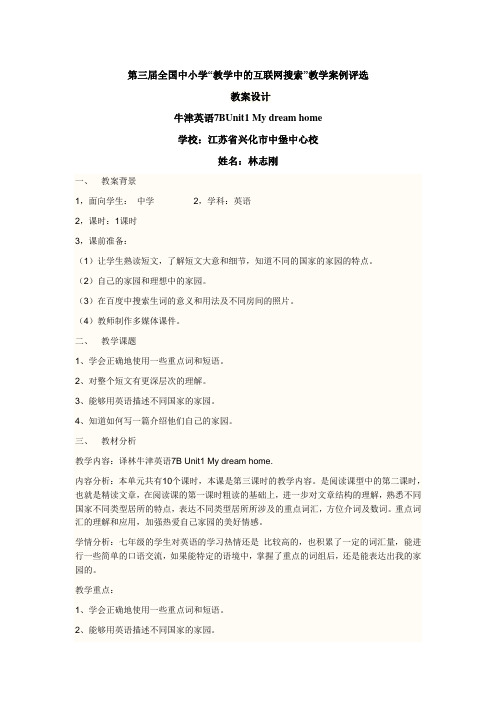
第三届全国中小学“教学中的互联网搜索”教学案例评选教案设计牛津英语7BUnit1 My dream home学校:江苏省兴化市中堡中心校姓名:林志刚一、教案背景1,面向学生:中学2,学科:英语2,课时:1课时3,课前准备:(1)让学生熟读短文,了解短文大意和细节,知道不同的国家的家园的特点。
(2)自己的家园和理想中的家园。
(3)在百度中搜索生词的意义和用法及不同房间的照片。
(4)教师制作多媒体课件。
二、教学课题1、学会正确地使用一些重点词和短语。
2、对整个短文有更深层次的理解。
3、能够用英语描述不同国家的家园。
4、知道如何写一篇介绍他们自己的家园。
三、教材分析教学内容:译林牛津英语7B Unit1 My dream home.内容分析:本单元共有10个课时,本课是第三课时的教学内容。
是阅读课型中的第二课时,也就是精读文章,在阅读课的第一课时粗读的基础上,进一步对文章结构的理解,熟悉不同国家不同类型居所的特点,表达不同类型居所所涉及的重点词汇,方位介词及数词。
重点词汇的理解和应用,加强热爱自己家园的美好情感。
学情分析:七年级的学生对英语的学习热情还是比较高的,也积累了一定的词汇量,能进行一些简单的口语交流,如果能特定的语境中,掌握了重点的词组后,还是能表达出我的家园的。
教学重点:1、学会正确地使用一些重点词和短语。
2、能够用英语描述不同国家的家园。
教学难点:1、知道如何写一篇介绍他们自己的家园。
四、教学方法创设情境法、讲授法、快乐教学法、问答法、练习法、讨论法五、教学过程Step 1.GreetingsStep 2. Revision1.The teacher asks students to guess a riddle to present the topic.I am a football fan.so I am interested in watching football games .Do you know where I watch it?I often sit on the sofa.There is a coffee table in front of the sofa.I can watch games while enjoy the food on the coffee table.so it is my favourite room.please give a guess.What is my favourite room?(猜谜导入揭示主题)2.Students get clear understanding of the structure of the reading passage by looking at pictures and answering the questions.Whose homes are they?How many rooms are there in Stephen's home?Which place does Stephen like best in his home? WhyWhat do Stephen and his friends do at the balcony ?What is Madee's house made of?Where is Madee's house?How do Madee and her family get into their house?Is the place Madee lives in beautiful?Which place does Neil like best in the house?What do the Neil’s family do in the evening? What pet does he have?Does Anna live in a house? Does Anna have her own bedroom?What does Anna often do with her sister in her bedroom?Are they very happy to live there?Why?(展示PPT,不同类型房间,不同结构的照片,回顾复习短文)(百度/czjydownload.asp?bdaction=dl#)4. The teacher encourages students to complete a passage about the homes.Stephen lives in a house in the USA.It has rooms.He likes best because he can , and there. Stephen and his friends like sitting on the and looking out at the and the .In the bedroom there is a .They often stay with me .Madee live in in Thailand .She her family in house.The house isa river.So she climbs to get into her house.It is very and here, But it a lot.Neil lives in a small house in a town near London.His favourite room in his house is the .His family and he often sit in it his mother .In the evenings,Neil's family like watching TV in .Neil has a dog.Its birthday is on of June. Anna lives in the of Moscow.She lives with her family in a on a busy street.It ison the floor. It is not large but they have a nice .Anna a bedroom her sister. They often in their bedroom.Their are very friendly and they happy there.(百度/en/2009/0111/article_83.html)(整体把握全文结构,让学生掌握重点词汇,划出重点词组,为下面讲授和应用重点词组做了铺垫。
2024英语同行学案七年级下册全文共3篇示例,供读者参考篇1Title: English Peer Study Case of Grade 7, Volume II, 2024Introduction:The English Peer Study Case of Grade 7, Volume II, 2024 is designed to help students enhance their English language skills in the second semester of their seventh grade. This case includes a variety of topics that cover grammar rules, vocabulary expansion, reading comprehension, and listening practice. Through interactive exercises, engaging activities, and peer discussions, students will deepen their understanding of the English language and improve their proficiency.Chapter 1: Grammar Rules ReviewIn this chapter, students will review key grammar rules such as subject-verb agreement, verb tenses, pronoun usage, and sentence structure. Through practice exercises and quizzes, students will solidify their knowledge of these rules and learn to apply them accurately in their writing and speaking.Chapter 2: Vocabulary ExpansionThis chapter focuses on expanding students' vocabulary through word lists, context clues, and word association exercises. Students will learn new words and their meanings, synonyms, antonyms, and usage in sentences. By regularly using these words in conversations and writing assignments, students will improve their language fluency and expressive abilities.Chapter 3: Reading ComprehensionIn this chapter, students will read a variety of texts including articles, short stories, and poems. They will be required to answer questions, summarize key points, make inferences, and evaluate the author's purpose. By practicing active reading strategies, students will enhance their reading comprehension skills and critical thinking abilities.Chapter 4: Listening PracticeThis chapter focuses on improving students' listening skills through audio recordings, videos, and online resources. Students will listen to dialogues, interviews, lectures, and songs, and then complete listening comprehension tasks. By honing their listening skills, students will become better equipped to understand different accents, tones, and speech patterns.Conclusion:The English Peer Study Case of Grade 7, Volume II, 2024 is a comprehensive resource that aims to help students achieve proficiency in the English language. By engaging in peer discussions, interactive exercises, and challenging activities, students will enhance their grammar, vocabulary, reading, and listening skills. This case is designed to promote collaborative learning, critical thinking, and language fluency among seventh-grade students.篇22024 English Peer Learning Case for Seventh Grade Second SemesterIntroduction:Welcome to the second semester of the seventh-grade English Peer Learning Case! In this document, you will find a detailed outline of the topics, activities, assessments, and resources that will be covered over the course of the semester. As we continue our journey to improve our English language skills, let's dive into the exciting content that awaits us.Week 1-2: Literature Analysis- Introduction to literary genres and elements- Reading and analyzing short stories- Identifying themes, characters, and settings- Writing a literary analysis essayWeek 3-4: Grammar Review- Review of basic grammar rules and concepts- Parts of speech, sentence structure, and punctuation- Practice exercises and quizzes- Peer editing workshopWeek 5-6: Vocabulary Expansion- Building a strong vocabulary through word roots, prefixes, and suffixes- Learning new words with contextual clues- Using vocabulary in sentence construction- Vocabulary quizWeek 7-8: Writing Skills- Developing effective writing skills: descriptive, narrative, expository, and persuasive writing- Crafting strong thesis statements and topic sentences- Peer review and feedback sessions- Final writing assignmentWeek 9-10: Speaking and Listening- Improving listening comprehension skills through audio materials- Participating in group discussions and debates- Practicing public speaking and presentation skills- Oral presentation assessmentWeek 11-12: Research Project- Choosing a research topic related to English literature or language- Conducting research using credible sources- Writing a research paper with proper citations- Presenting research findings to the classConclusion:As we conclude the second semester of the seventh-grade English Peer Learning Case, we have accomplished a great dealin enhancing our English language skills. Through engaging activities, collaborative learning, and targeted assessments, we have strengthened our abilities in reading, writing, speaking, and listening. I encourage you to continue practicing your English skills outside of the classroom and to embrace a lifelong love of learning. Thank you for your dedication and hard work throughout the semester. Good luck in all your future English language endeavors!篇32024 English Peer Learning Case VII Grade 7 Lower SemesterIntroductionThe 2024 English Peer Learning Case VII Grade 7 Lower Semester is a comprehensive study guide designed to help students improve their English language skills. This book covers a wide range of topics including grammar, vocabulary, reading comprehension, writing, and speaking. It is designed to be used in conjunction with regular classroom instruction to provide students with additional practice and support in mastering the English language.GrammarOne of the key focuses of this study guide is grammar. Students will learn about the different parts of speech, sentence structure, verb tenses, and more. They will also have the opportunity to practice using this grammar in a variety of exercises and activities to reinforce their understanding.VocabularyAnother important aspect of the study guide is vocabulary. Students will learn new words and phrases, and practice using them in context. They will also learn strategies for expanding their vocabulary, such as using word roots and context clues to figure out the meaning of unfamiliar words.Reading ComprehensionThe study guide also includes reading comprehension exercises to help students improve their ability to understand and analyze written texts. Students will practice reading passages and answering questions about the main idea, supporting details, and author's purpose.WritingWriting is another key component of the study guide. Students will practice writing different types of essays, including narrative, descriptive, and expository. They will also learn aboutthe writing process, including brainstorming, drafting, revising, and editing.SpeakingFinally, the study guide includes speaking activities to help students improve their oral communication skills. Students will practice speaking in different situations, such as giving presentations, participating in group discussions, and debating.Overall, the 2024 English Peer Learning Case VII Grade 7 Lower Semester is a valuable resource for students looking to improve their English language skills. It provides comprehensive coverage of grammar, vocabulary, reading comprehension, writing, and speaking, and includes a variety of exercises and activities to help students practice and master these skills. Students who use this study guide in conjunction with regular classroom instruction will be well-prepared to succeed in their English studies.。
Unit 10 It’s a nice day , isn’t ? 学案主备:李艳玲审核:宋小娟陈玉华陶立鹏第一课时:(section A 及语法)一.学习目标:1。
反意疑问句的理解的使用。
2。
本课时重要词组二.重难点:反意疑问句三.学法指导:学生预习,教师点拨,习题巩固。
多读多记四.本课时重要词组:Look like 看起来像I hope so 我希望如此by noon 直到中午The No . 15 bus 第十路公共汽车look through 浏览in an elevator / lift 在电梯里wait in line 排队Take an umbrella with sb 随身带着雨伞cross a busy street 穿过一条繁忙的街道五.语法:反意疑问句(p99 附加疑问句)1.反意疑问句的形式:一是“肯定陈述句+ 否定简短句”。
二是“否定陈述句+肯定简短句”。
反意疑问句的前后两部分在时态、人称和数上都要保持一致。
如:It looks very beautiful ,doesn’t it 它看起来很漂亮,不是吗?He doesn’t need to work so late , does he ? 他不必工作到那么晚,是吗?2.反意疑问句的回答:其答语为:肯定事实用yes ,否定事实用no ,就其语调而言,如表示疑问、怀疑或没把握,常用升调,如表示事实,有把握或加强语气,则用降调3.反意疑问句的使用规则:①当陈述句中有be 动词,助动词或情态动词时反意疑问句的附加疑问部分由“be/ will / have / can / could 或它们的否定形式+主语”构成,要符合“前肯定后否定,前否定后肯定”如:They are in the same class , aren’t they ?他们同班,对吗?You have had supper ,haven’t you ?你吃过晚饭了,对吗?She can’t sing , can she ? 她不会唱歌,对吗?He will go hiking ,won’t he ?他要去远足,对吗?②当陈述句中有实义动词时反意疑问句的附加疑问部分由“don’t / doesn’t / didn’t +主语或“do/does /did+ 主语”构成。
英语初一下译林牛津版unit1学案(第10课时) 【一】 单元总述 同学们,欢迎进入本单元学习!本单元是有关“梦想之家”这一主题内容。你有自己梦想的家吗?会使用英语来描述一些国家和首都、房屋和家居设施的名称吗?本单元介绍了具有有用功能的描述“梦想之家”的用语,并介绍了一些家中使用物的词汇,还介绍了基数词、序数词和介词。本单元通过问卷调查了解不同国家人的居住情况,启发同学们回想已学单词与新学词汇写一篇有关自己“梦想之家”的文章。 〔一〕 教学目标: 1、 基础知识: 单词:dream,palace,capital,balcony,cushion,beach,sea,bunk,town,wooden,over,climb,ladder,quiet,rain,while,sittingroom,street,share,friendly,above,diningroom,grow,most,lie,cupboard,bookshelf,shower,lamp,wardrobe,sink,bath,basin,infrontof,opposite,chalk,airconditioner,below,printer,shelf,top,tidy,sixteen,nineteen,seventy,ninety,thousand,million,arrive,seventh,sixth,come,exam,second,third,fourth,fifth,ninth,eleventh,twelfth,twentieth,sound,bathroom,mirror,afraid,still,message,atleast,groundfloor,swimmingpool,footballpitch 语法:序数词和基数词 任务:问卷调查不同国家人的居住情况并写一篇自己的梦想之家的短文。 2、 差不多技能: 通过听、说、读、写掌握本单元的对话、短文和相关词汇,并运用新词汇来谈论各自不同的居住情况。 3、 情感态度: 激发学生对本单元话题的兴趣,在了解本单元学习的内容要点后,指导学生有效地学习和掌握国家、首都和家居的词汇;让学生在合作中体会集体智慧的力量,取长补短,共同进步;了解不同国家的居住条件和文化差异的时候,进行爱国主义教育,团结各国朋友。 4、 学习策略: 综合应用和自主合作学习;通过图片和单词的配对,明白单词的意思以及国家和首都的配对;通过对词汇的归类,明白不同房间的家具设施;利用上下文语境及阅读技巧复习巩固所学知识。 5、 文化意识: 充分掌握有关国家和首都,了解不同国家的居住条件和文化差异。 〔二〕 重点概览 重点词汇:dream,capital,beach,sea,town,wooden,over,climb,ladder,quiet,rain,while,sittingroom,street,share,friendly,above,diningroom,grow,most,lie,bookshelf,shower,lamp,bath,infrontof,chalk,below,printer,shelf,top,tidy,sixteen,seventeen,nineteen,seventy,ninety,thousand,million,arrive,seventh,sixth,come,exam,second,third,fourth,fifth,ninth,eleventh,twelfth,twentieth,sound,bathroom,afraid,still,message,atleast,groundfloor,swimmingpool 重点句型:ThecapitalofJapanisTokyo. Yourhomeisdifferentfrommine. Ilikeyourgardenbehindthekitchen. Isharearoomwithmycousin.MayIspeakto….,please? Who’ scalling,please?Myphonenumberis……Pleaseaskhimtocallme.I’llaskhimtocallyouback. 语法:序数词和基数词 第十课时 Checkout [学习目标] 本单元我们学习了in/on/at/infrontof/behind/nextto/opposite等方位介词,顾名思义,方位介词是用来描述事物所处的位置的。通过这节课的学习我们能够大致了解这些词的用法。 [课前自主学习] 从所学的句子中找出带有方位介词的词组,看谁找的多,看谁找得全,睁大 你明亮的眼睛开始寻宝吧。看看下面的句子,有没有似曾相识的感受? 1.Arethereanyflowers___theteacher’sdesk? Yes,thereare. 2.Theirshoesare___thebed. 3.Millieis____ _______thegate. 4.Lilyis_____thetree. 5.Andyis_____PeterandNick. 6.Thereisabigtree___thecafé. 7.Isthereapicture_____thewall? 8.Therearesomeboats_____thelake. 9.Thedogis_____________theriver. 10.What’s________________thepark? Therearesomeboats. [体验与实践] 1)、预习情况交流 一、 同学们!是不是特别轻松地就找全了所学的方位介词词组?特别有成就感吧? 试试翻译下面的词组吧。 1、在咖啡馆附近 2.在盒子之间 3.在花后面 4、在湖上 5.在一楼 6.在讲台上 7.在…… 中间 8.在树上 9.在大门前 10.在A楼 11.在教室中间 12.在黑板上 2).重点热点点击 1、文中的put是作为动词put的过去式,表示Andy在过去做的…… 2.序数词用来表示顺序,序数词在句中可作主语,宾语,定语和表语。 Fe.Thesecondisthebest.(主) Helikesthethird.(宾) 找出以下句中的错误并改正 (1).Helivesonthetwelvethfloor. (2).Theteacherputshisbookonthedeskyesterday. (3).WewillhaveapartyintheafternoonofDecember9th. (4).Theteacherisinthefrontoftheclass. (5).HecameninethintheMathsexam. 3).目标达成检测 A、用适当的介词填空 1、 TheAmericanladylives____alargeflat_____WashtonD.C. 2、 Younggirlslikechatting____friendsontheInternet. 3、 TheChristmaspartyis____theeveningofDecember24th. 4、 Mybrotheroftenreadsnewspapers____breakfast. 5、 Thereisahouse____thelake. 6、 Doyoulive____thecenter___thetown. 7、 Hermotherandsheareshopping___abusystreet. 8、 Welcome_____ourcity. 9、 Thepartyis___six___theafternoon. 10.HainanIslandisagoodplacetogo____summer. B、完成句子〔每格一词〕 1、西蒙在三楼有一个电脑房。 Simon_____a_____room____the______floor. 2、“你有自己的房间吗?” “不,我和我的双胞胎姐姐两人一房间。” “____youhaveyour______room?” “No,I_____aroom____mytwinsister.” 3、在安迪的家里,二楼没有其他的房间了。 Thereare________rooms____the____inAndy’s_____home. 4、请把书放在书架上。 Please______thebook_____the______. 5、他住在第八层楼。 He__________the_____floor. [相关知识链接]
Unit 10 It’s a nice day,isn’t it?教学设计教材分析本单元的语言功能项目是“Make small talk”涉及到的语法是“反意疑问句”,另外还有“Thank-you note”的形式和内容,因此在教学中,要采用灵活、开放的教学模式,充分利用教材中的卡通画,紧密联系实际,为学生提供真实的情景来交流、讨论,从而实现本单元的目标教学。
Section A是语言功能的初步呈现和输入阶段。
师生可由1a部分的卡通画部分开始,通过呈现——展示——讲解——理解——操练——运用这几个环节,循序渐进,从而达到对反意疑问句这一语法现象的认识。
师生在完成1a卡通画的过程中,教师可对一些语言文化知识进行必要的补充,激发学生的兴趣和想象力,在师生的交流过程中完成1b的听力任务和1c 的说的任务。
2a是任务型听力,要求学生听完听力材料后,判断哪一个谈话是成功的“small talk”,同时让学生明白,只有交谈双方积极参与,这样的谈话才是一个愉快地、成功的“聊天”。
2b的句子通过听力进行排序,并在此基础上加以操练,注意运用反意疑问句来提问题。
在实施2c的教学中,可鼓励学生联系实际,用反意疑问句形式提出问题。
3a是“a small talk”在实际生活中的体现和运用,鼓励学生完成该对话并向全班同学汇报。
3b是在3a的基础上,对本单元语言功能“a small talk”的进一步巩固和操练,学生分组完成,如需要,教师可给必要的提示或帮助。
Section B是本单元语言功能项目“a small talk”的再现、巩固,以及语言的综合知识的扩展部分。
通过1a四幅画问题的讨论,介绍东西方语言文化背景知识的不同,同时练习1b的pairwork。
2a、2b的听力材料相同,但任务不同,在教学过程中,应以学生为主体,依次完成任务。
在2c的角色扮演中,鼓励学生运用生活实际情况提问题或利用2b、2c的内容来完成“a small talk”,3a是“Thank-you note”的示范展示,体现了语言的综合运用,3b和3c是“Thank-you note”的操练、模仿和运用,鼓励学生进行大胆的语言运用和输出。
我的课堂我做主,我参与,我收获!
1
下口九年一贯制学校初中部英语学案
七 年级 编辑教师 封丽平 时间 _5.16_
课题Unit 10 Section A (1a—2c)
课时
First
Learning Aims:
New Language:1.- Where did you go on vacation?
- I went to the mountains.
2.- Did you go to the beach?
-Yes,I did./No,I didn’t.
Learning Procedures:
流程一:课前热身:写出下列动词的过去式:评价自己 【/】
1. do- 2.play- 3.clean- 4.go-
5.is/am- 6.are- 7.visit- 8.study-
9.have- 10.spend- 11.ask- 12.cook-
13.watch- 14.read- 15.see- 16.write-
17.practice- 18.sit- 19.look- 20.want-
流程二:预习发现:英汉互译:记住我的名次第 名
1.呆在家里 2.go to New York City
3.拜访我的叔叔 4.go to summer camp
5.去爬山 6.visit museum
7.去沙滩 8.go on vacation
9.去中心花园 10.study for exam
1.camp n. summer camp 夏令营 2.central adj→( )n.
上周刚见面,
别忘了我们哟!
找一找,你会发现我!
发现
我的课堂我做主,我参与,我收获!
2
流程三:同步听力Ⅰ:1b & 2a
1. 把听到的5个动词短语写在横线上。
① Tina a.
② Brad b.
③ Sally c.
④ Xiang Hua d.
⑤ Tom e.
2.再听一遍,将活动与人物匹配。
3.照样子陈述句子。例如:Tina went to the mountains.
流程四:语法精讲:(含有实义动词的)一般疑问句的构成及回答。
-Did+主语+实义动词原形+其它?
-Yes,主语+did./No,主语+didn’t.
平行练习:①将上面画波浪线的句子变为一般疑问句:
?
② He did his homework at home yesterday.( 变一般疑问句,并作否定回答)
→ - he his homework at home yesterday ? - ,he .
流程五:同步听力Ⅱ:2b (提示:注意Yes/No)
流程六:Groupwork:(4人一组,分别扮演Nancy,Kevin,Julie and Reporter)
- Where did you go on vacation? - I ……
- Did you ……? Yes,I did./ No,I didn’t.
流程七:小结盘点:这节课你学会了哪些短语:
你掌握了哪个句子:
我的课堂我做主,我参与,我收获!
3